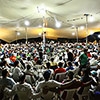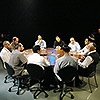Correct Yourself And You Will Not Suffer
 Question: In one of your lectures you said that suffering is remoteness from the Creator, from the light, correct yourself, and you will not be suffering; and in another lecture, the opposite: the brightest and the best people suffer the most. Can we possibly find the logic here?
Question: In one of your lectures you said that suffering is remoteness from the Creator, from the light, correct yourself, and you will not be suffering; and in another lecture, the opposite: the brightest and the best people suffer the most. Can we possibly find the logic here?
Answer: Yes, we can. The fact is that the one who knows how to use egoism wins.
And the great ones suffer because they try to reach out to ordinary people and raise them. And those, unfortunately, are deaf. And so it happens.
[276950]
From KabTV’s “Ask the Kabbalist” 3/20/19
Related Material:
Appeal To Ordinary People
How Can The Creator Desire Suffering And Pain?
How Can We Overcome Sufferings?











